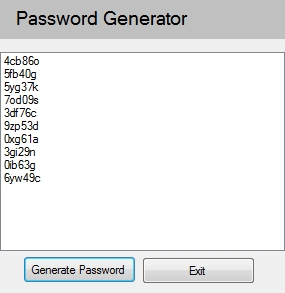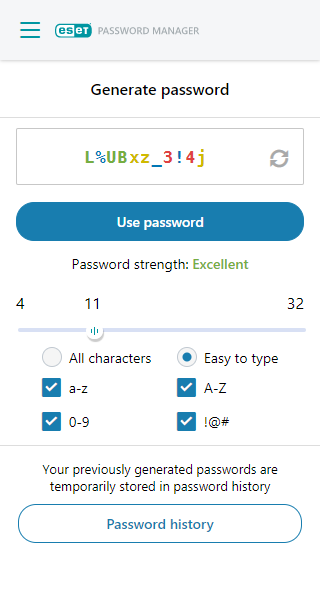

- #Generate password using words generator#
- #Generate password using words full#
- #Generate password using words code#
- #Generate password using words download#
- #Generate password using words free#
#Generate password using words code#
You can copy the highlighted code into the function body: def read_words(file_name): This is what the project structure should look like:

#Generate password using words download#
You can download and use them only for learning purposes, and at your own risk.
#Generate password using words full#
Our repo contains word lists along with the full code for this tutorial. If a malicious actor gets access to your word lists, they will be able to crack your passwords in a matter of seconds. When you create your word lists, make sure to keep them secure. You can prepare such lists manually or generate them by using one of the available large language models. That means we’ll need one or more word lists to pick from. The idea is to pick random words and make phrases out of them. Let’s modify the code so that it prints passphrases instead of “Hello World”. The Run tool window with “Hello World” will open at the bottom: Generate your first passphrase When you launch P圜harm for the first time, you’ll see the Welcome screen.
#Generate password using words generator#
In general, a passphrase generator is a program that makes passwords by combining random words into pseudo-sentences. For example, you can capitalize words to include uppercase letters, or add special characters and numbers as separators between the words.

Have a look at the following table:īoth are strong, but the passphrase is stronger and much easier to remember. But what would you rather memorize, A^1rL#2k2oPiA9H or PhysicianBuiltHotPotatoRegularly? By the way, the latter has 32 characters in it.Īpart from how easy or difficult a password is to memorize, we should also pay attention to how easy or difficult it is to crack. It contains lowercase and uppercase letters, numbers, special symbols, and is 15 characters long. Why is a passphrase better?Ī^1rL#2k2oPiA9H is a good, strong password. For example, PhysicianBuiltHotPotatoRegularly is a passphrase. Passphrases usually contain 4 to 5 words – the more, the better. It doesn’t have to make sense or to be grammatically correct. How many attempts and how much time is required depends on the password’s length and complexity.Ī passphrase is a password consisting of several random words. A brute force attack is basically making a number of attempts to guess the password until one of them eventually gets it right. Whenever you sign up for a service or a website, it requires you to create a long and unique password with numbers, special characters, uppercase letters, and so on.Īll these requirements are meant to make a password resistant to brute force attacks. For information about cloning, see the P圜harm documentation. To get the full code, you can clone the repository. Never use the passwords produced by this generator to protect any real data. Although you’ll get a working passphrase generator by the end of this tutorial, please consider it merely a learning project.
#Generate password using words free#
The purpose of the tutorial is to show how you can develop simple CLI applications for automating your everyday tasks by using the free P圜harm Community Edition.


 0 kommentar(er)
0 kommentar(er)
